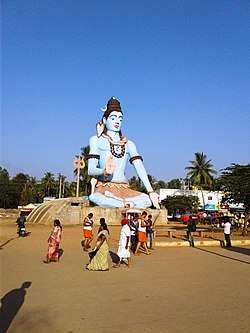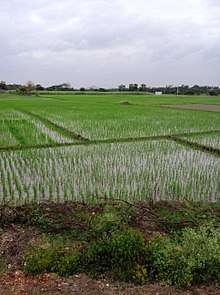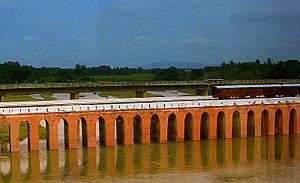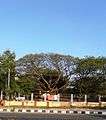Nanjangud
Nanjangud officially known as Nanjanagudu is a City and Taluk in Mysore district in the Indian state of Karnataka. Nanjangud lies on the banks of the river Kapila (Kabini), 23 km from the city of Mysore. Nanjangud is famous for Srikanteshwara Temple. Nanjangud is also called "Dakshina Kashi" (southern Kashi).[2] This city is also famous for a variety of banana grown in the region, the Nanjanagoodu rasabale.[3]
Nanjangud Nanjanagudu | |
|---|---|
City | |
 | |
| Nickname(s): Paddy Land, Dakshina Kaashi | |
| Coordinates: 12.12°N 76.68°E | |
| Country | |
| State | Karnataka |
| District | Mysore |
| Elevation | 656 m (2,152 ft) |
| Population (2011)[1] | |
| • Total | 50,598 |
| Time zone | UTC+5:30 (IST) |
| PIN | 571 301 |
| Telephone code | 08221 |
| Vehicle registration | KA-09 |
| Website | www.nanjanagudutown.gov.in; http://www.nanjanaguducity.mrc.gov.in |


Origin of the name
The Srikanteshwara Temple at Nanjangud is dedicated to the Hindu supreme deity Shiva, also called Sri Nanjundeshwara, ("The Lord who drank poison") to save the earth.[2] In Hindu mythology, the Gods and demons churned the ocean in search of the ambrosia. During this churning, poison emanated first, followed by ambrosia. To prevent the poison from spreading across the universe, Shiva drank it. His consort Parvati then held his throat tightly to prevent the poison from spreading to the rest of his body. The poison remained in his throat, making it blue in colour. For this reason, Shiva is also called Neelakantha, or "the blue-throated one". Nanjanagud literally means "the place where Nanja (Nanjundeshwara) resides" in Kannada - Nanja is a short form of Nanjunda (Najannu unDava - one who drank poison), or "home of Nanja (Nanjundeshwara)". Srikanteshwara translates to Sri meaning auspicious, Kanta meaning throat and Eshwara meaning Shiva.
History
Nanjangud has been a major Shaiva centre for nearly a thousand years. Chola Kings in the 11th – 12th century are considered to have built this temple with significant additions by the Hoysalas and the Vijayanagara kings.[4] This temple was later renovated by the Hoysala kings. The Wodeyar kings of Mysore made various grants to renovate the temple.
Geography
Nanjangud is located at 15.12°N 76.68°E.[5] It has an average elevation of 657 metres (2155 ft). The taluk borders Mysore taluk of Mysore district to the north, T Narsipur taluk of Mysore district to the east, H D Kote taluk of Mysore district to the west and Gundlupet and Chamarajanagar taluks of Chamarajanagar district to the south.
Nanjangud Town is the headquarters of Nanjangud Taluk which contains 5 hoblis and around 180 villages.[3]
WikiMapia.org Link:[6]
Getting there
Buses are available from Bengaluru, Mysore and Chamarajanagar. The nearest airport is Mysuru Airport situated at Mandakalli at a distance of 18 km from Nanjangud and 6 km from Mysuru.
Nanjangud has a railway station where only slow trains stop. Trains are available from Mysore at 4.50 am, 7.10 am, 8.50 am, 12.20 pm, 2.40 pm and 1.40 pm. Returns trains to Mysore are available at 7.38 am, 10.00 am, 11.28 am, 3.38 pm, 5.38 pm, 6.43 pm and 9.33 pm.
Places to see
Nanjundeshwara Temple
The town is famous because of the huge temple dedicated to Lord Nanjundeswara also referred to as Srikanteswara. It is believed that sage Gauthama stayed here for some time and installed a Lingam, the idol form of Shiva. Nanjangud is also known as Dakshina Kashi or Varanasi of the South.[3]
The temple was originally built by the Ganga rulers in the 9th century during their occupation of this region. The residing deity of the temple was later called Hakim Nanjunda; as given by the Tippu Sultan as it is said a favorite elephant of his was cured after prayer was offered to the deity. The same story is attributed to Hyder too (as per Mysore Gazetteer)! It is said and inscribed in the temple history that his favourite and beloved elephant was bestowed with eyesight by the Lord, after Tippu Sultan's vow with the local deity. The Sultan then had a Lingam made of jade along with an emerald necklace and donated it to the temple. The Vaidya Nanjundeswara, even today is said to be a healer for his believers, and one can see even today worshippers doing Urulu seve, a ritualistic practice after taking bath in the Kapila river. You will find a very old Bilva tree, near the main deity block, its custom to view the tree for full blessings, no one has the idea as to how old this tree is. The main bilva leaves is considered very auspicious and very sacred for Shiva Puja.[7]
Veda Brahma. T. S. Vishweshwara Dikshith is the composer of world-famous Sree Srikanteshwara Suprabhata Stotram of Lord. Srikanteshwara of Nanjangud. Sri. T. S. Vishweshwara Dikshith was a learned Sanskrit scholar in several Vedas (Yajur Veda in particular) and specialised in Ghana Krama - which is the essence of the Vedas. He also composed the Sree Sharada Suprabhata and Sree Chandramoulishwara Suprabhata of Sri Sharada temple, Sringeri and Sri Chandramoulishwara temple in V. V. Mohalla, Mysore respectively. He was a Ghana Pati and had mastered several Shastras such as Alankara Shastra, Jyothishya Shastra (Astrology), Tarka, and Vyakarana (Literature) to name a few. He received several awards and accolades from the Maharaja of Mysore, their holiness the pointiffs' of Sringeri Sharada Peetham and Kanchi Kamakoti Peetam respectively for contributions made to Sanskrit Literature. He was also a founding member of "Sri Surasaraswathi Sabha" under the able guidance of Jagadguru Sri Srimad Abhinava Vidyateertha Mahaswamigal, who was the 35th Acharya of the Sringeri Sharada Peetham
Twice every year thousands of worshippers gather for the famous Chariot Festival locally known as the Dodda Jathre and the Chikka Jathre. Idols of Lord Srikanteshwara, Goddess Parvathi, Lord Ganapathi, Lord Subramanya and Lord Chandikeshwara are kept in five separate chariots and a traditional puja is performed to the idols early in the morning on the Jathre day. After the puja, chariots are flagged off. Thousands of devotees pull the Chariots carved out of wood, across the streets of the old town. The town remains immersed in festivities on the Jathre days.
Parashurama Kshetra
Near Nanjangud is the sangam, where the Kapila and Kaundinya rivers meet. This place is termed as Parashurama Kshetra which is where the sage Parashurama is said to have cleansed himself from the sin of beheading his mother.[3]
It is said that Parashurama got immense peace of mind at this place which he did not get anywhere else. So he decided to make a penance at the place where Nanjundeshwara temple presently exists. At that time, only Adi Keshava Temple existed (which is now by the side of main-shrine). While cleaning up the place with his axe, he accidentally hit the head of Lord Shiva, who was performing penance underground. Blood started flowing and Parushurama was frightened to have committed another sin. Then Lord Shiva consoled him not to worry and build a temple of his, adjacent to Adi Keshava's. Lord Shiva also told Parashurama to perform penance at Nanjangud. Parashurama performed at the place where his temple presently is located. Lord Shiva was then immensely happy with it and gave blessings that those who visit Nanjangud should definitely visit Parashurama temple to complete their pilgrimage effectively and fruitfully. [8]
Oldest bridge in India

The bridge is across Kabini river, which has been declared as the oldest bridge with both railway line and road on the same bridge by the Government of India. It is located at the entrance of temple town here.
The Kabini Bridge was built by DalvoyDevraj in 1735 with brick, sand and stone in Gothic style. Though it was built before the railway tracks were laid, the bridge was and is more commonly labelled as a Railway bridge. The Kabini Bridge has a series of Gothic arches of 10ft span with 8ft wide intervening piers. The earth cushion over the arch crest is over 5 feet. The foundations are laid on rocky strata and built in lime concrete. The bridge is of stone masonry with lime concrete filling and mortar. It has 51spans of 10 feet and before 1902 it existed as a road bridge ferrying bullock, camel and horse carriage traffic across the Kabini. A narrow gauge Railway line was being built from Mysore to Nanjangud in 1902 and the Railways used the arched bridge to connect it to the Nanjangud railway station. Trains ran on this bridge from 1902 to 2007. The last train to run on this heritage rail infrastructure was on January 17, 2007 when the Railways decided to put a stop to meter gauge trains and operate broad gauge trains. Since broad gauge needs a different alignment from narrow and meter gauges, a new bridge was built across the Kabini.[9]
The bridge, built in 1735, is now 283 years old and a Heritage Monument declared by the Government of India.[10][11]
Sri Prasanna Nanjundeshwara Swamy Temple
More than 200 year old Shiva Temple, situated at CHIKKAIANA CHATRA village just 50 meters off OOTY Road the -Mysore-Nanjanagud Highway, Karnataka 571302, India (LatLong - 12.156037, 76.680267), Recently taken under the care of Karnataka Muzrai Department and rejuvenated the last couple of years. A calm and unexplored temple worth visiting.
Guru Dataatreya Swamy Temple
Dattaatreya Temple is located near Chamundeshwari Temple near to the banks of River Kapila. Sri Maha Sharabheshwara and Sri Pratyangira Devi is also installed in this temple.[12]
Hemmaragala Santhana Gopala Swamy Temple
This temple is also known as Hemmaragala Huchu Gopala Santhana Venugopala Swamy or “Koundinya Maharshi Kshetra ”.,[13] located 13.3 km from the main Nanjangud Srikanteshwara temple. The main idol is famously called as Tribhangi Kolalu Gopala, It is believed to be around 1800 year old and know for granting children for childless couples.you can find lot of real case testimonial on the YouTube channel. A must place to visit for childless couples
Legend has it, that the main deity was installed by Koundinya Maharshi, a famous sage and an ardent devotee of Lord Ganesha and a scholar[14].
As per the discussion with the main priest & old history, The Chola King who one ruled this region had 12 Female children and wished & prayed the main deity, Sri Venugopala swamy for a male child in order to continue his direct lineage. The lord appeared in the dream of king but to his surprise, the next day queen again gave birth to a baby girl. This made the king very angry and he criticized his queen badly, saddened by this the queen promises to commit suicide in front of the main deity, by putting forward her request to change the baby girl to boy, the next day.
As a miracle the next day in the brahmi lagnam (morning 3.30 am) the child turns into male. Witnessing this the queen with love and devotion calls the god “Huchhu Gopala”. For this as thanks giving the Chola Maharaja ( King) made the stone floaring to the Kalyaani.
Now also lot of couples visit the temple to get blessed with children. Here you will find the sacred stick which believed to be of Koundinya Maharshi
Upon entering, one can view columns or pillars depicting the architecture of Vijayanagara times and the Udbhava Narasimha, lion god is holy and amazing to watch.The main idol is adored by Sri.Krishna in Tribhangi style, with the Gopikas, cows, Gopala and Sanath Kumara Also, the Utsava murthy which is kept reminds us of the old times[15]
Other attractions
Scenic places within a 100 km radius of Nanjangud include Bandipur National Park, Shivsamudram, Kabini Reservoir etc.[3] and Chamundheswari temple of Chamundi hill near Mysore, Sutturu, Male Mahadeshwara temple and Devanur Mutt (The Great saint Gurumalleshwara), (Devanoor Village, Nanjangud Taluk)-571301, 15 km from Nanjanagudu.[16] Sri Prasanna Nanjundeshwara Temple in Chikkaiyana Chathra Village. Nanjangud is also surrounded by scenic villages like Chikkaiyana Chathra and Chinnadagudihundi which are filled with cute little temples and lush green Agricultural field.
Ayurveda
Nanjangud is famous for the Ayurveda medicines manufactured by the Late Sri B.V. Pandit. The Sadvaidyashala established by him serves people very successfully. Ayurvedic medicines produced here are marketed all over India. In earlier times (1950–70) a tooth powder brand made locally called 'Nanjangud Hallupudi' was also very famous all over Karnataka. Currently B.V Pandit's grand Daughter Kalpana Pandit is a famous Movie star.
Economy
Nanjangud is a home to many industries which are mainly located in the Nanjangud Industrial Area which is spread across 534 acres (2.16 km2). In Nanjangud 3 Industrial areas been established viz., Nanjangud Industrial area, Thandya Industrial area and Adakanalli Industrial area. It all started with the now closed Sujatha Textile Mills (STM) which at its peak used to employ about 3000 people. Since then, STM has closed down. However, there are other industries which thrived. There are 36 major industries, 12 medium industries and 35 small-scale units at Nanjangud. According to NIA, Nanjangud is the second highest tax-paying (sales tax of over Rs400 crore a year) taluk in the State after Bangalore. Bannari Amman Sugar factory in Nanjangud has a cane crushing capacity of 7,500 TCD.
Sports
Football players like N.S.Manju are came from nanjangud to represent nation in football.
Nanjanagudu Banana
A popular variety of banana locally found in Devarasanahalli Village known as Nanjangud Rasabaale has also made Nanjangud famous all over the region. Nanjanagudu banana has been accorded Geographical Indication (GI).[17] Its GI tag is 29.[18] However Nanjangud rasabale is now confined to only around 30 acres
Kayyar Kinhanna Rai has authored a famous Kannada poem "Nanjanagudina Rasabaaley" titled "Hannu Maruvavana Haadu".[3]
Image gallery
 Ambedkar Circle
Ambedkar Circle Vivekananda Park
Vivekananda Park Mahadeshara Temple
Mahadeshara Temple Nanjangud Ground
Nanjangud Ground Post Office
Post Office
Location
References
- "Census of India Search details". censusindia.gov.in. Retrieved 10 May 2015.
- "Nanjangud Town Municipal Council, Karnataka". Nanjangud Town Municipal Council. Archived from the original on 2 August 2013. Retrieved 25 July 2013.
- "Nanjangud". Retrieved 28 August 2012.
- "Official Site of Gov of Karnataka".
- "Falling Rain Genomics, Inc - Nanjangud". Fallingrain.com. Retrieved 16 September 2012.
- "Location on wikimapia". wikimapia.org. Retrieved 1 May 2016.
- "Nanjangud Shree Kanteswara temple and Kabini river, tourist details". www.go2india.in. Retrieved 22 November 2019.
- "Mysore District Information". Mysore.nic.in. Retrieved 16 September 2012.
- "Karnataka Today". karnatakatoday.com.
- "WebHost4Life | Web Hosting, Unix Hosting, E-Mail, Web Design". ourkarnataka.com. Retrieved 1 May 2016.
- "Samyuktha Harshitha: The oldest Railway bridge". samharshbangalore.blogspot.in. Retrieved 1 May 2016.
- "Guru Dattaatreya Swamy Temple, Nanjangud | Nanjangud.Info". nanjangud.info. Retrieved 1 May 2016.
- Hemmaragala Huchu Gopala Santhana Venugopal Swamy Nanjangud Karnataka tourism, retrieved 22 November 2019
- Raadhika (26 October 2015). "A story a day-Stories from Hindu Mythology and Other Morale Stories: The story of Sage Koundinya". A story a day-Stories from Hindu Mythology and Other Morale Stories. Retrieved 22 November 2019.
- "Temples of Karnataka - Hemmaragala - Sri.Venugopala Temple". templesofkarnataka.com. Retrieved 22 November 2019.
- "Devanur Dasoha Mutt - Devanuru Village, Nanjangud Taluk". wikimapia.org. Retrieved 1 May 2016.
- "K'taka gets highest number of GI tags | Business Standard News". business-standard.com. Retrieved 1 May 2016.
- List of Geographical Indications in India
External links
| Wikimedia Commons has media related to Nanjangud. |
| Wikivoyage has a travel guide for Nanjangud. |